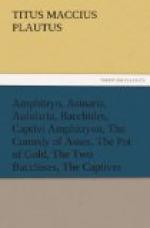grasping that neither law nor cobbler can take their
measure. And now supposing some one should
ask: “Who are the rich girls with
dowries going to marry, if you make this rule
for the poor ones?”
quo lubeant, nubant, dum dos ne fiat comes. hoc si ita fiat, mores meliores sibi parent, pro dote quos ferant, quam nunc ferunt, ego faxim muli, pretio qui superant equos, sint viliores Gallicis cantheriis.
Why, anyone they please, let ’em marry, provided their dowry doesn’t go along with ’em. In that case, instead of bringing their husbands money, they’d bring them better behaved wives than they do at present. Those mules of theirs that cost more than horses do now—they’d be cheaper than Gallic geldings by the time I got through.
Eucl.
Ita me di amabunt ut ego hunc ausculto
lubens.
nimis lepide fecit verba ad parsimoniam.
(aside)
God bless my soul, how I do love to hear him
talk! Those
thoughts of his about economizing—beautiful,
beautiful!
Mega.
Nulla igitur dicat “equidem dotem ad te adtuli maiorem multo quam tibi erat pecunia; enim mihi quidem aequomst purpuram atque aurum dari, 500 ancillas, mulos, muliones, pedisequos, salutigerulos pueros, vehicla qui vehar.”
Then you wouldn’t hear them saying: “Well, sir, you never had anything like the money I brought you, and you know it. Fine clothes and jewellery, indeed! And maids and mules and coachmen and footmen and pages and private carriages—well, if I haven’t a right to them!”
Eucl.
Ut matronarum hic facta pernovit probe.
moribus praefectum mulierum hunc factum
velim.
(aside)
Ah, he knows ’em, knows ’em through and
through,
these society
dames! Oh, if he could only be appointed
supervisor of
public morals—the women’s!
Mega.
Nunc quoquo venias plus plaustrorum in
aedibus
videas quam ruri, quando ad villam veneris.
sed hoc etiam pulchrum est praequam ubi
sumptus petunt.
Wherever you go nowadays you see more wagons in front of a city mansion than you can find around a farmyard. That’s a perfectly glorious sight, though, compared with the time when the tradesmen come for their money.
stat fullo, phyrgio, aurifex, lanarius; caupones patagiarii, indusiarii, flammarii, volarii, carinarii; 510 stant manulearii, stant[10] murobatharii, propolae linteones, calceolarii; sedentarii sutores diabathrarii, solearii astant, astant molocinarii;[11] (514) strophiarii astant, astant semul sonarii. (516)
The cleanser, the ladies’ tailor, the jeweller, the woollen worker—they’re all hanging round. And there are the dealers




